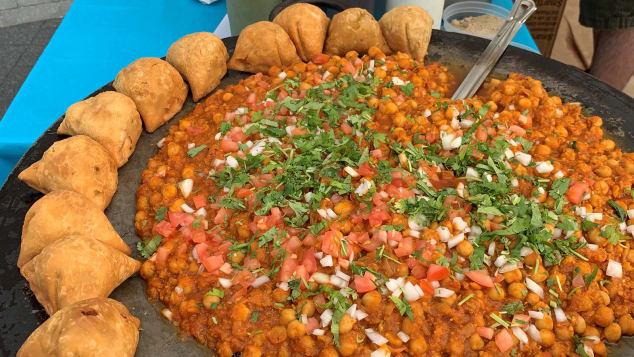In a normal year, more than 60 million visitors will flock to the Big Apple. If they’re craving Indian cuisine they are likely to end up in the eminent enclaves of Queens’ Jackson Heights or an area on Manhattan’s East Side known affectionately as Curry Hill.
But New York has a way of overshadowing the cultural abundance that percolates directly beyond its borders. That’s quite literally the case with Jersey City, just across the Hudson River. Here, the country’s most vibrant Indian neighborhood lies hidden under the silhouette of a lower Manhattan skyline.

The country’s most vibrant Indian neighborhood lies hidden under the silhouette of the Lower Manhattan skyline. Pictured here is the 2019 Surati Holi Hai Color Walk.
Paul Martin
Jersey City’s significance is by no means some well-guarded secret. Asian-Indians account for more than 11% of the local population — a higher proportion than any other major American city. It has hosted one of the country’s largest Holi festivals every spring dating back to 1992. And regional press has been highlighting its status as a Hindu hub since the mid-’80s. It is a tale seldom told to tourists, however.
India Square
The story centers around a two-block-long strip of Newark Avenue. This is India Square: a dense menagerie of eateries, grocers, jewelers and clothing shops representing one of the fastest-growing ethnic enclaves in the United States.
Satinder Saggar was among the first wave of restaurateurs to set up shop along the corridor. For 23 years, he’s been running Rasoi, an endearing diner specializing in Punjabi fare.
Hailing from a state in the northwestern part of India, this cuisine typically consists of savory proteins slathered in rich gravies. Chicken makhani and lamb vindaloo are long-running standouts on the lengthy menu.
“When I opened, I was the second one here,” he recalls. “Now there are more than 20 Indian restaurants on either side. And over the last 10 years, it is getting increasingly popular.”

Rasoi, an endearing diner specializing in Punjabi fare, has been in India Square in Jersey City for 23 years.
Courtesy Rasoi
Today he is joined by other hotspots such as Raaz, where diners can enjoy a smattering of delicacies ranging from the Indo-Persian flavors of a robust kadai paneer to a fruit and nut-studded stew of Punjab known as navratan korma. Kolkata style fish fingers inspired by Bengali flavors arrive alongside rara gosht — a goat curry from the north — and an aromatic vegetable biryani traditional to the south.
At Curry On, the aforementioned rice dish is instead built around chicken, roasted on the bone. A style known as Hyderabadi, it comes together under the slow-cooking method of dum pukht. The kitchen is equally adept at preparing rogan josh, a Kashmiri curry flavored with alkanet flower and red chilis.
Old, new and fusion fare
As of late, speciality shops are popping up, focusing on particular items and regions.
Paratha Junction excels at the eponymous flatbread — typically stuffed with potatoes and paneer. Korai Kitchen is a newcomer featuring a full Bengali menu. At Sri Ganesh’s Dosa House, you can select from vegetarian renderings of the southern Indian snack food staple.

Rassoi’s sizzling chicken platter is both popular and quite colorful.
Courtesy Rasoi
While most of these establishments own an unassuming, ‘home-cooked’ kind of vibe, a polished, upscale element is emerging.
“There’s definitely a lot more higher-end places opening up,” observes Suvir Bhalla, a first-generation immigrant who has lived in Jersey City for eight years. “Raaz and Vaibhav have more of a modern vibe. And at Mantra they’re mixing in some Manchurian flavors. That’s a big thing these days — Asian fusion.” To wit, an entire section of menu here is dedicated to ‘Indo-Chinese’ rice and noodles.
Although he appreciates the experimentation, Bhalla is more compelled by preparations most familiar to his youth. “If I’m not eating my mom’s cooking, I’ll eat at Rasoi,” he admits.
Even before finding a new home here, ‘JC’ was already informing the flavors of his old one. “Long before I moved, my parents would always go food shopping in Jersey City,” he says. “It’s the hub for my people.”
The sentiment is shared by many Indian immigrants throughout the Tri-State area. And in a surprising role reversal, more and more New Yorkers — of all backgrounds — find themselves exiting to Jersey when its time for cultural exploration.
‘India away from India’

Navratan korma (‘nine gem’ vegetable curry) is a must-have if dining at Raaz.
Courtesy Raaz
“Jersey City is like India away from India,” notes Vikas Khanna, a Michelin-starred chef and former host of MasterChef India. “The aromas, cuisine and traditions are very intact here with the community. I travel here [from New York City] for inspirations. I’m proud to see the growth of heritage and acceptance of India here. It is now the more expanded version of a Jackson Heights.”
Saggar traces much of that expansion back to the immediate aftermath of September 11, when some New Yorkers where eager to leave the city without venturing too far away. Indeed, with the steel towers of the Financial District looming overhead, you often feel as though you never left.
More than a good meal

Samosa chaat is served on a tawa pan at Raaz.
Courtesy Raaz
But he also points to the widespread cultural acceptance his people have enjoyed on this side of the river. It goes well beyond fans of the food.
“We are the only city in the US that closes down the streets for four separate Indian festivals throughout the year,” he proudly declares, adding that the local government has actively supported these efforts.
That support has proven particularly crucial throughout 2020. Like all other brick-and-mortars in the food and beverage space, Rasoi is reeling from pandemic-related shutdowns, in spite of high-volume takeout pre-pandemic.
With indoor dining at 25% of capacity, the city’s allowance of immediate expansion of outdoor eating — reclaiming parking spots and helping to beautify streetside dining zones — has helped. “Mayor [Steven] Fulop has been a good friend to the Indian community,” adds Saggar.
Fulop, who assumed office in July of 2013, is quick to deflect praise back at the business owners. “The reality is that this community deserves the credit for organically changing an area of the city that was in need,” he tells CNN.

Jersey City is host to the Surati Holi Hai. One of the largest Festival of Colors, it was canceled because of Covid this year, but this photo from 2019 depicts the colorful, lively celebration.
Paul Martin
“Where the city has been helpful is providing resources on grants, streetscape redesign, small business loans, expanded branding, and resources to complement their efforts and make the area more appealing.”
It all adds up to a winning recipe. On a weekday night, you can now spot a younger crowd lined up outside EggMania, anxiously awaiting recreations of Indian street food from the popular fast casual.
Clutching paper bags loaded full with egg bhurji and surti gotala, they rush out the door. Not because they’re eager to leave. They just need to catch the last PATH train back to that other city they call home.
Facebook Comments


 NRIForShaadi.com
NRIForShaadi.com
